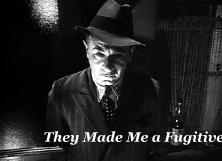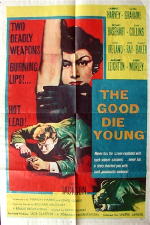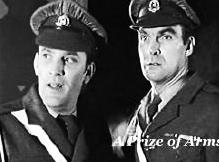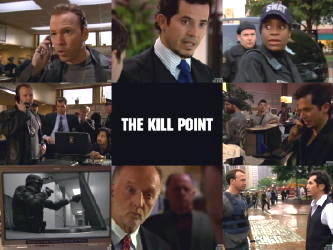Fri 27 Jun 2008
The post-war British crime film floated in and out of phases where ex-servicemen are seduced into criminal activity (through a sense of adventure or, more often, the fleeting rewards of black-marketeering and/or corruption by a ‘good time girl’) and, quite often, band together to use their war-time experience to commit crime.

The late 1940s produced such noirish British thrillers as They Made Me a Fugitive (1947; d. Cavalcanti, from the novel A Convict Has Escaped by Jackson Budd), in which Trevor Howard’s down-on-his-luck ex-RAF pilot is drawn into a black marketeering racket; The Flamingo Affair (1947; d. Horace Shepherd) where an ex-Commando captain, infatuated by a femme fatale, agrees to rob his employer’s safe just to keep her in nylons; and in Night Beat (1948; d. Harold Huth) two soldiers returning to civilian life are caught up in black market dealing which inevitably leads to murder.
These films depicted the post-war malaise of returning servicemen trying to readjust to civilian life but, unable to handle various personal disappointments, find themselves sucked into what initially appears an appealing underworld escape. Unlike their U.S. counterpart, at that time, these films were more a case of social commentary than full-blown adventure (such contemporary American films noir as The Blue Dahlia, 1946, and Dead Reckoning, 1947, for example).

Later British films tended to utilise the dependancy on cameraderie of ex-military types. The Intruder (1953; d. Guy Hamilton, from Robin Maugham’s novel Line on Ginger) saw ex-Colonel Jack Hawkins discover his flat being burgled by one of his former troopers, leading to a search through men in the same Army company for psychological/social motives. Lewis Gilbert’s The Good Die Young (1954; from a novel by Richard Macauley) follows four men – an American ex-soldier, an ex-boxer, an American Air Force sergeant who has deserted, and an unscrupulous playboy (a menacing Laurence Harvey) – who plan and carry out an armed mail van robbery. The Ship That Died of Shame (1955; d. Michael Relph and Basil Dearden, based on a novel by Nicholas Monsarrat) brought together a group of ex-Navy men and a wartime motor gunboat to go into the business of cross-Channel smuggling. A thieves-kitchen atmosphere pervaded Tiger in the Smoke (1956; d. Roy Baker, from the story by Margery Allingham) where a gang of war veterans search for their former sergeant who, during a wartime commando raid, deprived them of some hidden loot.

Next to The League of Gentlemen, perhaps the most rewarding of the military-operation type robbery films of this period is Cliff Owen’s suspenseful A Prize of Arms (1962; scripted by Paul Ryder from a story by Nicholas Roeg and Kevin Kavanagh) in which ex-Army officer Stanley Baker and two others pull off (well, nearly) a quarter of a million pounds (£) army payroll robbery. The heightened suspense of the meticulous operation builds and sustains in best ticking-clock fashion.
Fascinating as most of these films are, whether as social observations or caper thrillers, you are quite right, Steve, in observing that the viewers’ edge-of-the-seat experience develops in the unexpected (and unwanted) instances leading to the inevitable downfall. But what an exhilarating journey they lead.
Incidentally, I recently enjoyed The Kill Point (2007), an eight-hour US miniseries taking on the social/psychological angles of a group of ex-Special Forces vets as they sustain a siege following a failed bank robbery. The sub-genre, if indeed it is one, seems to continue quite happily.

A forgotten footnote to the above:
The author of The League of Gentleman, John Boland (who held the post of Chair of the Crime Writers’ Association, 1963-64), also scripted an episode of the long-running and popular Scotland Yard detective drama No Hiding Place (ITV, 1959-67) called ‘The Smoke Boys’ (1963). The episode was tantalisingly described in contemporary TV listings as a baffling series of bank robberies which our regular Scotland Yard detective heroes realise are not committed by any ordinary gang of criminals.
Any ordinary gang of criminals? Could this have been a small-screen reworking of the League …? Perhaps, one day…
June 29th, 2008 at 7:44 am
Thanks for this, Tise and Steve! I was thinking also of They Made a Fugitive, but I’ve never seen it, so I thought I should check about it before saying anything about it in public.
In terms of more general British film noir, J. Lee Thompson’s film with Diana Dors, called Yield to the Night (1956), should also probably be mentioned. Thompson went on to Hollywood and did the superb Cape Fear with Mitchum — and then he went down to do mostly crap.